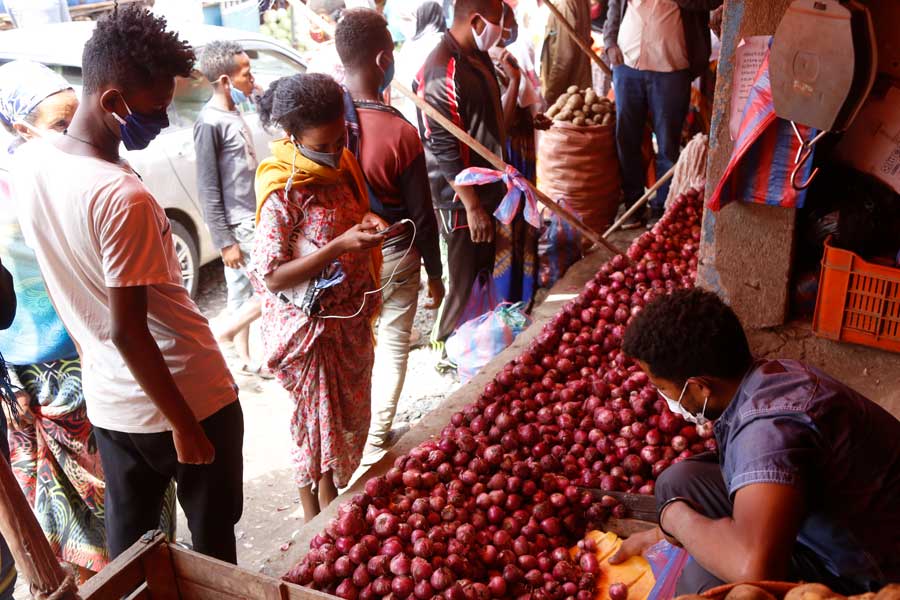
Radar | Sep 03,2022
Dec 28 , 2019
By SEBLE WONDEMAGEGN ( FORTUNE STAFF WRITER )
They can also store maize at ECX's warehouse until demand and prices increase.
Maize farmers in Nekemte and Bure can now store their grains in a warehouse provided by the Ethiopia Commodity Exchange (ECX) until demand or the price of the commodity increase.
For the service, the ECX in partnership with the Commercial Bank of Ethiopia (CBE) and International Finance Corporation (IFC), a member of the World Bank Group, launched a Warehouse Receipt Finance (WRF) programme on December 26, 2019. Before launching the service, the ECX and IFC have been conducting research and piloting the programme for 18 months.
The programme will allow maize farmers, cooperatives, traders and processors to store their crops for a maximum of three months.
The system provides a solution to regulate the seasonal market fluctuations exhibited during post-harvesting seasons when supply is higher and lower prices of the products exist, according to Wondimagegnehu Negera, CEO of the ECX.
"It is important for farmers who often lack bankable collateral and are therefore forced to sell their crops immediately after harvest when prices are at their lowest," he said.
While the farmers store the grain at the integrated warehouse, the ECX issues a receipt to the delivery of commodities based on industry-accepted grades and standards. At the warehouse, commodities are sampled, weighed and graded.
The ECX issues an electronic goods received note (GRN) and provides the depositors or their representatives with a signed print copy. The GRN is not negotiable, transferable or representative of legal title to the deposited commodity, but depositors can use the receipt as collateral to access credit from CBE without being asked for additional guarantees.
The depositor has to get an electronic warehouse receipt (EWR) issued by the ECX central depository in order to establish legal title to the deposited commodity, according to Wondimagegnehu.
Loans worth up to 70pc of the value of the stored commodity will be issued at an interest rate based on the market price of maize, and they must be repaid within three months by selling the commodity through ECX's trading platform. The buyer, including cooperative unions, can also store the commodity for two months.
About nine million farmers in Ethiopia produce maize. In 2017, 2.3 million hectares of land was covered by maize that produced 83.9 million quintals of the crop.
In the process, the IFC extended its support to the ECX and CBE under the Collateralised Commodity Finance (CCF) project. The project aims to introduce innovative financial instruments to drive efficiency, inclusiveness and competitiveness in the agricultural value chain.
ECX has invited farmers, traders and cooperatives in and around Nekemte and Bure to apply at CBE branches to use the service.
Mohammed Aman, assistant professor at the School of Agriculture Economy & Agribusiness at Haramaya University for more than a decade, recommends the service to be demand-driven rather than supply-driven. He also says it has to be a win-win approach for the farmers, explaining that the cooperatives get better marketing information than the farmers.
''The service should be provided based on the interest of the farmers not by the demand of the cooperatives,” he said.
Mohammed also recommends that awareness creation activities should be carried out to build up the understanding of the farmers and unions about the system and the programme.
"There should also be insurance coverage for the crop," he recommended.
Established in 2007 and starting operations the following year, the ECX currently trades 14 agricultural commodities. During the first five months of this fiscal year, it has traded 237,309tn of commodities worth 12.5 billion Br. Compared to the performance of last year's same period, the volume and value have increased by 27pc and 19pc, respectively.
PUBLISHED ON
Dec 28,2019 [ VOL
20 , NO
1026]

Agenda | Jun 20,2020

Fortune News | Aug 20,2022

Verbatim | Dec 16,2023

Radar | Nov 26,2022

Fortune News | Dec 19,2018

Dec 22 , 2024 . By TIZITA SHEWAFERAW
Charged with transforming colossal state-owned enterprises into modern and competitiv...

Aug 18 , 2024 . By AKSAH ITALO
Although predictable Yonas Zerihun's job in the ride-hailing service is not immune to...

Jul 28 , 2024 . By TIZITA SHEWAFERAW
Unhabitual, perhaps too many, Samuel Gebreyohannes, 38, used to occasionally enjoy a couple of beers at breakfast. However, he recently swit...

Jul 13 , 2024 . By AKSAH ITALO
Investors who rely on tractors, trucks, and field vehicles for commuting, transporting commodities, and f...

Jul 5 , 2025
Six years ago, Ethiopia was the darling of international liberal commentators. A year...

Jun 28 , 2025
Meseret Damtie, the assertive auditor general, has never been shy about naming names...

Jun 21 , 2025
A well-worn adage says, “Budget is not destiny, but it is direction.” Examining t...

Jun 14 , 2025
Yet again, the Horn of Africa is bracing for trouble. A region already frayed by wars...